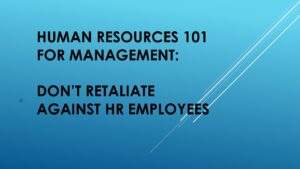On a recent flight, Google engineer James Damore decided to draft a memorandum in which he rambled on about, in his opinion, Google’s misdirected attempt to achieve racial and gender diversity in the workplace. There is no evidence Damore was denied a job or promotion due to favorable treatment towards a minority or female candidate. Damore just wanted to vent about his employer’s policy on diversity. The more controversial parts of the document include Damore’s opinion that the lack of equal representation of women in the tech industry, as well as in positions of leadership, did not stem from discrimination but rather due to biological differences between men and women. According to the Damore, women genetically possessed greater neuroticism (higher anxiety, lower stress tolerance) than men. I believe this “biological differences” argument was used in the past to justify discrimination against African-Americans, but I digress.
Damore decided to share his memorandum internally with co-workers. The memo went viral, and Google responded by terminating Damore’s employment based on a violation of its Code of Conduct policy. Damore is now threatening to sue. Damore supporters decried political correctness had run afoul. Damore opponents applaud Google’s decision to strongly and swiftly address discriminatory attitudes in the workplace. Which side is right?
If you are employed in Texas you are probably “at-will,” which means your employer can terminate you for any reason that does not violate a specific law, such as anti-discrimination laws. This includes being foolish enough to disseminate a memo or post on social media negative things about your employer or co-workers. You have no First Amendment or “free speech” rights unless you are employed by a government employer (e.g. federal, state, city, county or school district), and even as a public employee you cannot say whatever you want.
For employers like Google, if prompt action is not taken it could be argued in other discrimination cases that the company fosters biased attitudes in the workplace by not disciplining workers whose words and actions are discriminatory. In fact, Google is currently in litigation over claims of gender pay disparity. Their reaction to Damore’s memo was therefore not a surprise.
Employers just need to be careful to ensure that their policies do not inhibit or prevent valid employee complaints and communications about workplace issues, while making it clear that discriminatory or harassing behavior is prohibited.
Section 7 of The National Labor Relations Act provides protections for “concerted activities” of two or more employees in addressing workplace concerns. Damore’s memo was distributed to co-workers so it could be view as a “concerted activity.” Was the memo, however, a concerted activity about workplace concerns, or just a personal rant about political correctness that included discriminatory stereotypes about women? Probably the latter, but we will have to wait and see the outcome. That is unless Google and Damore quietly settle their legal dispute first.
What lessons can we learn from this Google “Diversity” memo? Keep your opinions to yourself … and watch the inflight movie.
“Better to remain silent and be thought a fool than to speak out and remove all doubt.”
- Abraham Lincoln





